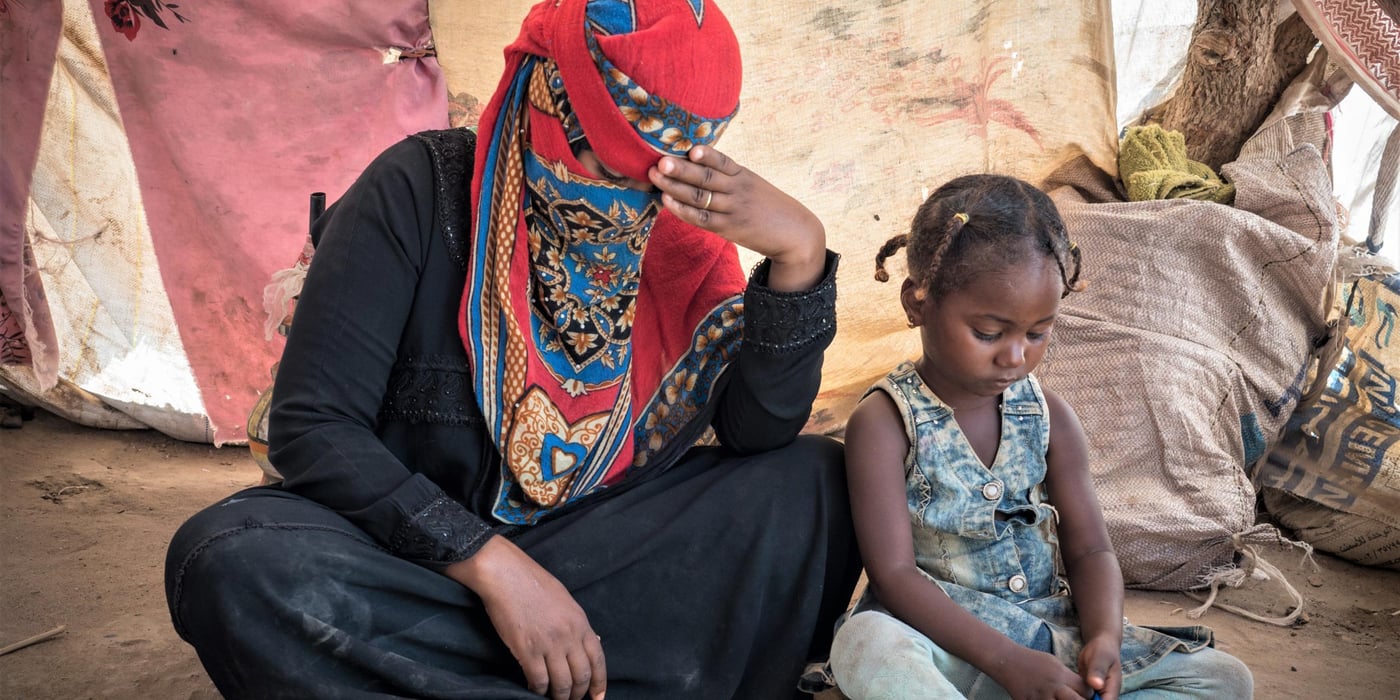
Här är 10 saker du borde veta om det som händer i Jemen:
# 1: Fattigdom och brist på demokrati
Bakgrunden till konflikten handlar om fattigdom, arbetslöshet, vattenbrist och korruption, samt en brist på demokrati och politisk representation. Missnöjet ledde till omfattande och våldsamma demonstrationer i kölvattnet av den arabiska våren 2011, och president Saleh tvingades avgå.
Läs också: Ser att nödhjälp gör skillnad
# 2: En konflikt med djupa rötter
Konflikten har djupa rötter. Sedan 2004 har det varit strider mellan myndigheterna och rebellerna från Ansar Allah, även känd som Houthi-rörelsen. Gruppen tillhör en lokal riktning inom shia-islam och utgör ungefär en tredjedel av Jemens befolkning. I september 2014 tog de lokala rebellerna från Ansar Allah och styrkor, lojala till tidigare president Saleh, kontroll över huvudstaden Sanaa.

# 3: Grannländerna blandar sig i
I mars 2015 gick en sammanslutning av flera länder i regionen ledd av Saudiarabien (även kallad koalitionen), och med stöd av USA och flera andra västländer, i krig mot rebellerna från Ansar Allah. Sedan dess har situationen blivit allt värre.
Läs också: Det här är en kris som människor har skapat
# 4: Världens största ”människoskapade” svältkris
Kriget har lett till hyperinflation, arbetslöshet och brist på löneutbetalningar, liksom akut brist på bränsle, mat och mediciner. 2015 levde hälften av landets 29 miljoner invånare på mindre än två dollar om dagen, utan tillgång till rent vatten och bra sanitetsförhållanden. Av landets 29 miljoner invånare behöver 22 miljoner humanitär hjälp. Av dessa är hälften i akut nöd. Ungefär en halv miljon barn lider av akut undernäring.

# 5: Dödlig koleraepidemi
Brist på löner och mediciner har lett till att den offentliga hälsovården har kollapsat, och bara ett fåtal har råd med privata hälsovårdstjänster. Brist på vaccin och mediciner leder till att många, särskilt barn, dör av sjukdomar som de lätt kunde ha behandlats för. Ett kolerautbrott under 2016 härjar fortfarande i landet. Över 900 000 människor tros ha blivit smittade, och över 2 000 har dött sedan april 2017.
Läs också: Så räddar vi liv i Jemen
# 6: Bombar civila och stoppar nödhjälp
Över 8 700 människor har dödats och över 50 000 sårats sedan konflikten bröt ut. Tre miljoner människor har tvingats lämna sina hem. FN har anklagat alla parter i konflikten för attacker på sjukhus, skolor och marknader och för att hindra nödhjälpsleveranser till civilbefolkningen.

# 7: Stängda gränser dödar
Stängda gränsövergångar, flygplatser och hamnar har gjort det nästan omöjligt att få in nödhjälp i Jemen. Det har lett till en akut brist på mat och mediciner och är en direkt orsak till att barn dör av undernäring och sjukdomar som lätt kunde ha behandlats.
# 8: FN har tvingats lämna landet
Sedan den arabiska våren 2011 har FN försökt medla i konflikten, men utan resultat. Så länge regeringen och koalitionen stöds av USA, Storbritannien och Frankrike, som alla har vetorätt i FN:s säkerhetsråd, är det osannolikt att säkerhetsrådet kommer att spela en avgörande roll i Jemenkonflikten.

# 9: FN har lanserat en fredsplan
FN har tagit fram en fredsplan, som de försöker få med parterna på, men hittills har det varit omöjligt att få dem att acceptera alla punkter i förslaget. Vapenvila, demilitarisering i städerna och en gemensam samlingsregering är de viktigaste punkterna i FN:s utkast till ett fredsavtal.
# 10: Västvärlden har försett krigförande parter med vapen
Under 2018 har ett antal europeiska regeringar stoppat vapenexporten till länder, som driver på kriget riktat mot civilbefolkningen och ett vapenembargo diskuteras i EU. Sverige och Norge är ett par av de länder som fått hård kritik för pågående vapenexport.


![Yasin Ismail has been working for NRC for five years and believes NRC is one of the best organisation to work for. Yasin started working for NRC as an Education Assistant and is now an Education Coordinator at NRC's Aden area office.
Yasin believes education is a critical component of the work NRC does, because of its great impact on people’s lives. He recognises it as a basic human right, important to the development of children and youth to fulfill their potential, and critical to breaking the inter-generational cycle of poverty.
The impact of the conflict in Yemen has been catastrophic. Schools have been destroyed or occupied by armed groups or displaced populations, which have deprived children in some areas from accessing school for more than four years.
Children in Yemen are struggling to cope with the violence they have faced during the conflict, and continue to face imminent danger as conflict carries on and exposes them to UXOs, mines and crossfire.
Yasin believes the security situation, which results in restricted access and unpredictable funding for education, are two of the main challenges in his job. He said that affected communities need access to aid but will sometimes have challenges accessing this due to long delays at checkpoints or challenges reaching distribution sites.
Yasin wants to help and support those affected by war in Yemen and believes that we can change the world with education. “[We should] Always follow our dreams and believe in ourselves. For every ending - there is a new beginning, for every memory - there is a dream ahead.”
"I hope for peace and stability for our people and country. I hope for our children and youth to get quality education because that will help them to build their future. I believe the education is the only approach to protect future generations, because it gives people a chance for healthy development, restores a sense of normality, and provides important life skills. Further to that, an education intervention is an investment in the long-term future, and in the peace, stability and economic growth of Yemen”.
More information:
These kids, like many others, leave for school very early because it takes them an hour or as long as two hours for some to walk. Ensuring children have sufficient access to nutrition is very important for children expending huge amounts of energy on commuting, learning and playing, and ensures they are able to engage appropriately in class. Lialy was among the children without anything to eat before coming to school. NRC has started to provide high energy biscuits to children in Lialy's school, who expressed their happiness at receiving the biscuits. Several children mentioned feeling more energetic and active as a result, and said they could concentrate more in class.
Information about the school:
Al-Qadisia school is located in Al-Qubbiyta district in Lahj and was one of the first schools in which NRC has delivered programmes. NRC's team describe the AlQadisia as a normal school with an engaged community but experiencing problems including nearby landmines. As displaced families continue to move into the area, the number of students at the school continues to grow, creating overcrowding. NRC's programme is supporting rehabilitation of the school building, distribution of recreational, cleaning and scholastic materials, training of teachers and provision of high energy biscuits for students.
Education in Hard to Reach Areas:
One of NRC’s global priorities is to deliver aid and services to people in hard to reach areas. We worked with the Education Department to select this school and others identified as being among the most in need. In travelling to the school form NRC's office in Aden, staff encounter several checkpoints, threatened areas and landmines.
Our programming in Yemen's southern governorates reaches people in Lahj, Abyan and Al-Dalea, among other areas. Operating in these areas is complicated and challenging: our staff travel through checkpoints, some of which create traffic, preventing access to project sites. Several areas remain affected or threatened by conflict, explosions are often heard, landmines dot areas across Yemen and bureaucratic challenges delay or complicate processes.
Where mines explode, civilians can suffer on multiple levels as people cannot only sustain injuries, but lose mobility and access to fields and other sites used for cultivation.
Efforts should be made to call on the authorities and specialised organisations to strengthen demining operations and reduce the number of civilian casualties.
Photo: Ingrid Prestetun/NRC](/cdn-cgi/image/width=1400,format=auto,fit=crop,height=700/globalassets/sverige/yemen-31.jpg)

